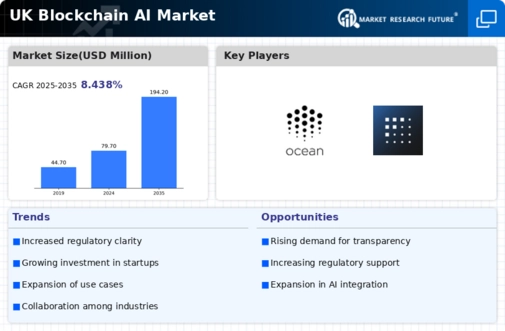Advancements in AI Algorithms
The evolution of artificial intelligence algorithms is significantly influencing the blockchain ai market. In the UK, advancements in machine learning and deep learning techniques are enabling more sophisticated data analysis and decision-making processes. These innovations allow businesses to leverage blockchain's transparency and immutability while enhancing predictive analytics capabilities. As a result, organizations are increasingly adopting blockchain ai solutions to optimize operations and improve efficiency. The market is expected to witness a growth rate of around 30% over the next five years, driven by the demand for intelligent systems that can analyze vast datasets in real-time. This synergy between AI and blockchain is likely to redefine operational paradigms across various sectors.
Rising Demand for Data Security
the market is experiencing a notable surge in demand for enhanced data security solutions. As businesses increasingly rely on digital transactions, the need for secure data management becomes paramount. In the UK, data breaches have prompted organizations to seek innovative technologies that can safeguard sensitive information. Blockchain technology, combined with artificial intelligence, offers a robust framework for ensuring data integrity and confidentiality. This trend is reflected in the market, where investments in security-focused blockchain ai solutions are projected to grow by approximately 25% annually. The integration of these technologies not only mitigates risks but also fosters consumer trust, thereby driving further adoption within the blockchain ai market.
Supportive Government Initiatives
The blockchain ai market is being positively influenced by supportive government initiatives in the UK. Policymakers are increasingly recognizing the potential of blockchain and AI technologies to drive economic growth and innovation. Various funding programs and grants are being introduced to encourage research and development in these fields. For instance, the UK government has allocated significant resources to support projects that integrate blockchain and AI, aiming to position the country as a leader in technological advancements. This proactive approach is expected to stimulate investment and collaboration within the blockchain ai market, fostering an environment conducive to innovation. As a result, the market may experience accelerated growth, with an estimated increase of 15% in new startups focusing on these technologies.
Growing Interest from Financial Institutions
the market is witnessing increasing interest from financial institutions in the UK. Banks and investment firms are exploring the potential of blockchain technology to streamline operations and enhance security. The integration of AI into these systems allows for improved risk assessment and fraud detection, which are crucial in the financial sector. Recent reports indicate that investments in blockchain ai solutions by financial institutions could reach £1 billion by 2026. This trend reflects a broader shift towards digital transformation in finance, where the combination of blockchain and AI is seen as a means to gain competitive advantage and improve customer service. As these institutions adopt innovative technologies, the blockchain ai market is likely to flourish.
Increased Focus on Transparency and Traceability
The blockchain ai market is benefiting from a heightened emphasis on transparency and traceability in supply chains. In the UK, consumers and businesses alike are demanding greater visibility into the origins and journey of products. Blockchain technology provides an immutable ledger that records every transaction, while AI enhances the ability to analyze and interpret this data. This combination is particularly valuable in industries such as food and pharmaceuticals, where provenance is critical. The market is projected to expand as companies invest in blockchain ai solutions to meet regulatory requirements and consumer expectations. It is estimated that the adoption of these technologies could lead to a 20% reduction in supply chain inefficiencies, thereby enhancing overall productivity.
















